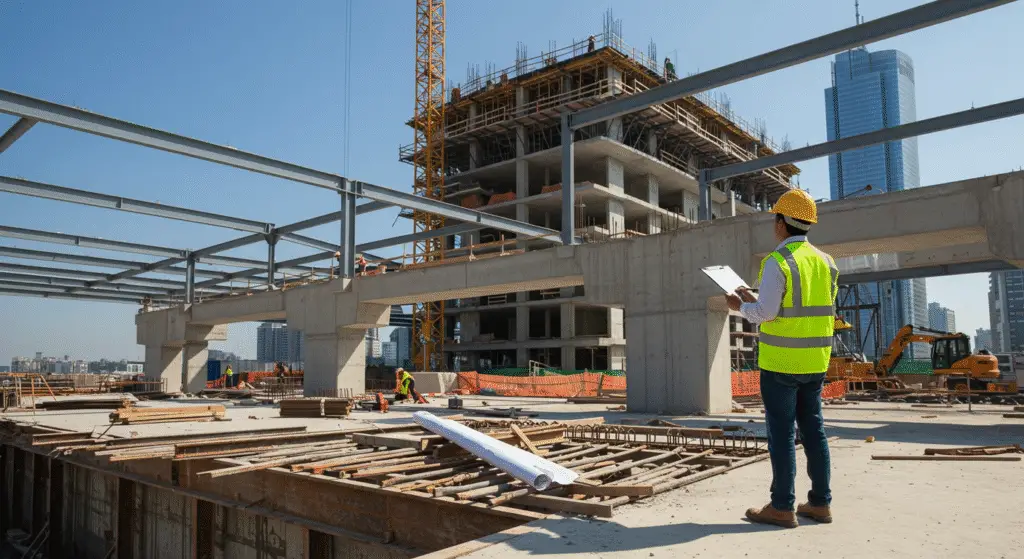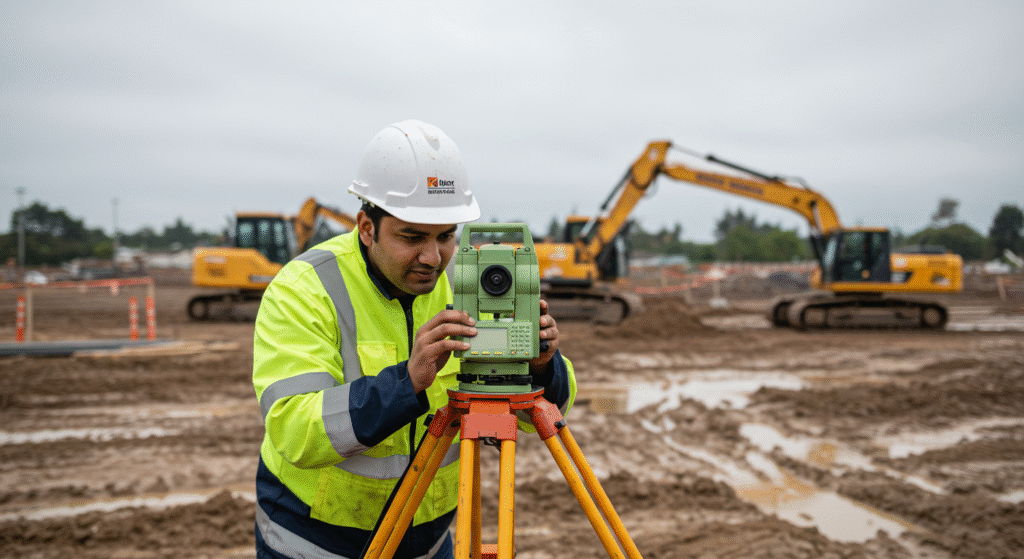
What is field work in civil engineering?

At the heart of the civil engineering profession lies a deep-rooted connection to the physical world, a relationship that extends far beyond the confines of the office or the classroom. While civil engineers are renowned for their technical expertise, analytical prowess, and innovative problem-solving skills, it is their ability to translate these intellectual pursuits into tangible, real-world solutions that truly sets them apart.

This vital link between theory and practice is embodied in the concept of field work – the hands-on, onsite activities that civil engineers undertake to gather data, assess site conditions, monitor construction progress, and ensure the successful execution of their designs. From surveying the terrain and evaluating soil samples to overseeing the construction of bridges and buildings, field work is an essential component of the civil engineering discipline, one that not only informs the decision-making process but also imbues the profession with a sense of purpose and direct impact.
In this comprehensive article, we will delve into the diverse and dynamic world of field work in civil engineering, exploring the critical role it plays in shaping the built environment, the unique challenges and considerations it entails, and the ways in which it empowers civil engineers to transform their ideas into tangible, real-world achievements.

The Importance of Field Work in Civil Engineering
The importance of field work in civil engineering cannot be overstated. While the design and planning stages of a project are undoubtedly crucial, it is the on-site activities and hands-on engagement that truly bring these plans to life, ensuring the safety, functionality, and long-term viability of the infrastructure being constructed.
- Site Assessment and Evaluation:
- Civil engineers rely on field work to gather critical information about the physical environment, from the characteristics of the soil and terrain to the presence of existing structures and utilities. This data is then used to inform the design process, allowing engineers to develop solutions that are tailored to the specific constraints and challenges of the project site.
- Construction Monitoring and Quality Control:
- Throughout the construction phase, civil engineers play a vital role in overseeing the work, ensuring that the materials, techniques, and safety protocols are being properly implemented. By regularly visiting the site and conducting inspections, they can identify and address any issues or deviations from the plan, safeguarding the quality and integrity of the final product.
- Stakeholder Engagement and Communication:
- Field work provides civil engineers with the opportunity to interact directly with project stakeholders, including clients, local authorities, and community members. This face-to-face interaction allows them to better understand the needs and concerns of these stakeholders, fostering open communication and building trust, which are essential for the successful completion of any project.
- Continuous Learning and Adaptation:
- The dynamic nature of field work, with its unique challenges and unexpected developments, encourages civil engineers to continuously learn, adapt, and refine their skills. By immersing themselves in the real-world conditions of a project, they gain valuable insights and hands-on experience that can inform their future work and drive innovation within the industry.
The Diverse Responsibilities of Civil Engineering Field Work
The scope of field work in civil engineering is remarkably broad, encompassing a wide range of activities and responsibilities that span the project lifecycle, from the initial planning stages to the final completion and handover.
- Site Surveying and Exploration:
- Civil engineers often begin their field work by conducting detailed surveys of the project site, using specialized equipment such as GPS, laser scanners, and drones to gather precise measurements and mapping data. This information is then used to create accurate models and simulations, informing the design and decision-making process.
- Geotechnical Investigations:
- To understand the physical properties and load-bearing capacity of the soil and rock formations at a project site, civil engineers often conduct geotechnical investigations, including the collection and analysis of soil samples, as well as the performance of in-situ testing and monitoring.
- Construction Supervision and Quality Assurance:
- Throughout the construction phase, civil engineers play a crucial role in overseeing the work, ensuring that materials, processes, and safety protocols are being properly implemented. This may involve conducting regular site inspections, reviewing construction documents, and liaising with contractors and subcontractors to address any issues or deviations from the plan.
- Infrastructure Maintenance and Repair:
- Even after a project has been completed, civil engineers may be called upon to conduct field work related to the ongoing maintenance and repair of infrastructure, such as bridges, roads, and water treatment facilities. This may involve conducting structural inspections, assessing the condition of materials, and developing strategies for rehabilitation or replacement.
- Disaster Response and Emergency Management:
- In the event of natural disasters or other emergencies, civil engineers may be called upon to participate in field work related to damage assessment, emergency repairs, and the restoration of critical infrastructure. This requires a high degree of adaptability, problem-solving skills, and the ability to work under challenging conditions.
The Challenges and Considerations of Civil Engineering Field Work
While the importance of field work in civil engineering is undeniable, it is a domain that is not without its unique challenges and considerations. Civil engineers who engage in field work must be prepared to navigate a wide range of complex and often unpredictable situations, requiring a diverse skill set and a deep understanding of the physical environment.
- Safety and Risk Management:
- Working in the field can expose civil engineers to a variety of potential hazards, from heavy machinery and confined spaces to inclement weather and environmental hazards. Ensuring the safety of both themselves and their team is a top priority, requiring the implementation of rigorous safety protocols, personal protective equipment, and comprehensive risk management strategies.
- Logistical Coordination:
- Coordinating field work activities can be a complex and logistically challenging endeavor, as it often involves the collaboration of multiple stakeholders, the management of equipment and resources, and the need to adapt to changing site conditions and schedules.
- Data Collection and Analysis:
- The collection and analysis of field data is a critical component of the civil engineering process, but it requires specialized skills and tools, as well as a deep understanding of the underlying scientific principles and methodologies.
- Environmental and Community Considerations:
- Civil engineering projects can have significant impacts on the surrounding environment and local communities, and field work must be conducted in a manner that minimizes disruption, respects stakeholder concerns, and adheres to relevant environmental regulations and guidelines.
- Adaptability and Problem-Solving:
- The dynamic and often unpredictable nature of field work requires civil engineers to be highly adaptable, capable of quickly identifying and addressing emerging challenges, and adept at finding creative, evidence-based solutions to complex problems.
Embracing the Future of Civil Engineering Field Work
As the civil engineering profession continues to evolve, driven by technological advancements, sustainability imperatives, and the changing needs of communities, the role of field work is also undergoing a transformation, introducing new opportunities and considerations for aspiring professionals.
- Digital Technologies and Data-Driven Insights:
- The integration of emerging technologies, such as drones, laser scanning, and BIM (Building Information Modeling), is enabling civil engineers to collect more comprehensive and accurate field data, leading to more informed decision-making and the development of innovative, data-driven solutions.
- Sustainability and Environmental Stewardship:
- As the world grapples with the pressing challenges of climate change and resource scarcity, the field work of civil engineers is increasingly focused on promoting sustainable practices, reducing environmental impact, and developing resilient infrastructure that can withstand the effects of natural disasters and environmental stressors.
- Interdisciplinary Collaboration:
- The complexity of modern civil engineering projects often requires the collaboration of professionals from a diverse range of disciplines, including urban planners, environmental scientists, and public policy experts. Field work provides a crucial platform for these interdisciplinary teams to come together, share their expertise, and develop integrated, holistic solutions.
- Community Engagement and Social Impact:
- As civil engineers strive to create infrastructure that serves the needs of communities, field work is becoming an increasingly important avenue for engaging with stakeholders, understanding their priorities and concerns, and ensuring that the final project aligns with the social and economic aspirations of the people it is meant to serve.
By embracing these emerging trends and continuously expanding their skills and knowledge, civil engineers can position themselves at the forefront of progress, leveraging the power of field work to drive innovation, promote sustainability, and make a lasting positive impact on the world around them.
Conclusion
The field work of civil engineers is a vital and multifaceted component of the profession, one that bridges the gap between the theoretical and the practical, enabling these professionals to translate their technical expertise into tangible, real-world solutions that shape the built environment and serve the needs of communities.
From site assessments and construction monitoring to infrastructure maintenance and disaster response, the diverse responsibilities of civil engineering field work require a unique blend of technical skills, problem-solving abilities, and adaptability – qualities that are essential for navigating the dynamic and often unpredictable challenges that arise in the physical world.
As the civil engineering landscape continues to evolve, driven by technological advancements, sustainability imperatives, and the changing needs of communities, the role of field work is also undergoing a transformation, introducing new opportunities and considerations for aspiring professionals. By embracing these emerging trends and continuously expanding their skills and knowledge, civil engineers can position themselves at the forefront of progress, leveraging the power of field work to drive innovation, promote sustainability, and make a lasting positive impact on the world around them.
Ultimately, the field work of civil engineers is not merely a component of the profession – it is the very foundation upon which the built environment is constructed, a vital link between the conceptual and the tangible that empowers these professionals to transform their ideas into transformative realities.
- https://worldcivilsociety.com/which-field-is-best-in-civil-engineering/
- https://worldcivilsociety.com/which-engineering-has-the-highest-salary/
- https://worldcivilsociety.com/navigating-the-engineering-landscape-determining-the-best-type-of-engineering/
- https://worldcivilsociety.com/how-many-sectors-are-there-in-engineering/
